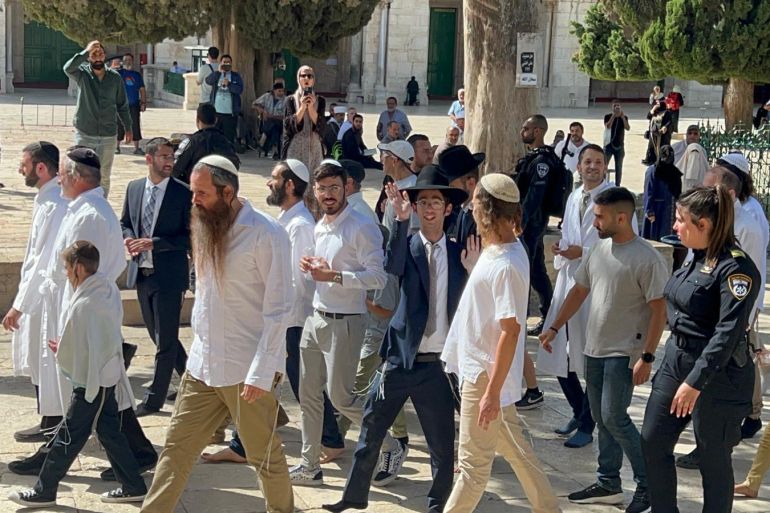What does the ‘status quo’ mean at Jerusalem’s Al-Aqsa Mosque?
The status quo of Jerusalem’s Al-Aqsa Mosque compound is the reason why a single police raid can precipitate an all-out war.

The legal status of Jerusalem’s Al-Aqsa Mosque compound, known to Jews as the Temple Mount, is a recurring flashpoint in the Israel-Palestine conflict.
Last week, Israeli police raided the Al-Aqsa Mosque, attacking and arresting Palestinian worshippers who had been inside the prayer hall. Rockets were shot into Israel from Gaza and Lebanon in retaliation, leading to a brief flare-up in violence.
Keep reading
list of 3 itemsWhat’s behind the Ramadan raids at Jerusalem’s Al-Aqsa Mosque?
Israeli forces attack Palestinians in Al-Aqsa for second time
In 2021, a similar raid led to an 11-day Israeli assault on the Gaza Strip.
To understand how a single police raid can precipitate a war, one must understand the status quo governing the Al-Aqsa Mosque compound.
What is the status quo?
For Palestinians – and under international law – the matter is quite simple.
“Israel doesn’t have sovereignty over [East] Jerusalem and therefore doesn’t have sovereignty over Al-Aqsa,” which is in Israeli-occupied East Jerusalem, says Khaled Zabarqa, a Palestinian legal expert on the city and the compound. Consequently, Zabarqa says, international law dictates that Israel is not authorised to implement any status quo.
For the Palestinians and the Waqf, the Jordanian-appointed body that manages the Al-Aqsa compound, it is a status quo rooted in the site’s administration under the Ottoman Empire, which dictated that Muslims have exclusive control of Al-Aqsa, according to Nir Hasson, a journalist for Haaretz covering Jerusalem.
The Israelis, however, see things differently, despite international law not recognising any attempt by an occupying power to annex territory it has occupied.
“The status quo that Israelis speak about is completely different from the status quo that the Waqf and Palestinians speak about,” explains Hasson.
For Israel, the status quo refers to a 1967 agreement formulated by Moshe Dayan, a former Israeli defence minister. After Israel occupied East Jerusalem, Dayan proposed a new arrangement based on the Ottoman agreement.
According to Israel’s 1967 status quo, the Israeli government allows the Waqf to maintain day-to-day control of the area, and only Muslims are permitted to pray there. However, Israeli police control the site’s access and are responsible for security, and non-Muslims are allowed to visit the site as tourists.
Shmuel Berkovits, a lawyer and expert on holy places in Israel, says the status quo established in 1967 is not protected by any Israeli law. In fact, in 1967, Dayan established the status quo without the government’s authority, he says.
Since 1967, legislation, court actions and statements by the Israeli government created a framework for this status quo. While no Israeli law prohibits Jews from praying at Al-Aqsa, the Israeli Supreme Court decided that the prohibition is justified to maintain the peace, explains Berkovits.
For many Israelis, even this is considered “generous”, in light of their victory in the 1967 war.
Recent changes to the status quo
Between 1967 and 2000, non-Muslims could buy tickets from the Waqf to visit the site as tourists. However, after the Palestinians’ second Intifada, or uprising, broke out in 2000 following former Israeli Prime Minister Ariel Sharon’s contentious visit to Al-Aqsa, the Waqf closed the site to visitors.
The site stayed closed to visitors until 2003, when Israel forced the Waqf to acquiesce to the entry of non-Muslims. Since then, non-Muslim visitors have been restricted by the Israeli police to limited hours and specific days.
According to Hasson, the Waqf does not acknowledge these visitors, and considers them “intruders”.
In 2015, a four-way agreement between Israel, Palestine, Jordan and the United States reaffirmed the 1967 status quo. As part of the agreement, Israeli leader Benjamin Netanyahu reaffirmed his country’s commitment to the status quo.
While the 1967 version of the status quo is still given lip service today, Zabarqa says: “This is an attempt to mislead international public opinion.”
Since 2017, Jews have tacitly been allowed to pray in the compound, according to Eran Tzidkiyahu, from the Hebrew University of Jerusalem and the Regional Thinking Forum.
Not all Jews are guilty of these breaches. In fact, before entering the Al-Aqsa compound, visitors pass a sign warning Jews that the Chief Rabbinate forbids them from entering because of the holiness of the site.

It is primarily religious Zionists, currently represented in Israel’s government by hardliners like the far-right Security Minister Itamar Ben-Gvir, who pray at the site and apply pressure to change the status quo, says Hasson.
For them, this pressure has paid off. Hasson says the police have given the Jews who pray on the Al-Aqsa compound more freedom since 2017.
Zabarqa laments that the Israeli police force “has transformed itself from a professional body that preserves the rule of law to a body that provides protection for people breaking the law”.
Palestinians, meanwhile, see these changes as an attempt to “make the compound Jewish and to dismiss the Muslims and Islam from Al-Aqsa”, says Zabarqa.
For them, Al-Aqsa is the last small corner of Palestine not under full Israeli occupation.
Hasson says Palestinians therefore take pride in resisting Israel’s occupation of the site, but if Palestinians lose Al-Aqsa, it will be as if “it’s all lost. Nothing is left.”